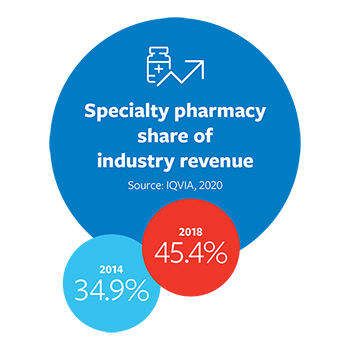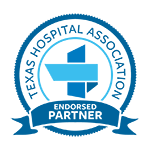In 1992, Congress created section 340B of the Public Health Service Act to help vulnerable and uninsured patients access prescription medication. The act, referred to as 340B, requires pharmaceutical manufacturers participating in Medicaid to sell outpatient drugs at a discounted price to health care organizations that care for a large proportion of low-income or uninsured patients.
340B allows covered entities to stretch sometimes scarce funds to serve their communities. The program supports uninsured patients with options that help them afford their prescription medications.

Optimizing 340B savings can improve patient care and reduce readmissions to emergency departments. To monitor referral capture, hospitals may find it beneficial to add Third Party Administrator (TPA) services.
SUNRx provides 340B programs that meet the unique needs of Texas hospitals, and help hospitals maximize their 340B programs with innovative consulting solutions.
The Growth of the Specialty Pharmaceutical Industry
As the specialty pharmaceutical industry grows, there may be significant savings opportunities for hospital 340B programs. According to data from IQVIA, “growth in revenue for specialty drugs is outpacing revenue growth for traditional drugs.” Their data show that specialty pharmacy industry revenues grew from 34.9% of the industry in 2014 to 45.4% in 2018.
The development of therapies for chronic diseases led to growth in the specialty pharmacy industry. These drugs often require higher tracking of patient data, which falls into services specialty pharmacies support.
Specialty pharmacies can also act as 340B contract pharmacies, which renders savings for qualified patients back to the covered entity. In addition, because these medications often cost more than traditional medications, savings may be more significant.
As with any 340B contract pharmacy relationship, the covered entities must choose pharmacies their patients utilize to pull savings back to their 340B program. Covered entities with in-house specialty pharmacies may also support 340B savings programs.
What is Specialty Pharmacy?
Specialty pharmacy services are becoming more common, but there is some disagreement on what defines a specialty pharmacy.
The National Association of Specialty Pharmacy (NASP) describes it as “a patient-centric design providing a comprehensive and coordinated model of care. The medications and expert services that specialty pharmacies ensure appropriate medication use and achieve superior clinical outcomes.”

The Academy of Managed Care Pharmacy (AMCP) distinguishes specialty pharmacy services by saying, “specialty pharmacies coordinate many aspects of patient care and disease management. They deliver medications with special handling, storage and distribution requirements. Specialty pharmacies also improve clinical outcomes for patients with complex, chronic and rare conditions.”
Specialty pharmacies provide all the services noted above for patients, covering a wide range of illnesses. However, not all specialty pharmacies operate in the same way. For example, some specialty pharmacies support all disease states and service all 50 states, while others might focus more on specific disease states or have a regional ability to dispense.
Choosing a Third Party Administrator
As specialty pharmacy continues to grow, it will be a focus of covered entities participating in 340B programs.
Covered entities that have not started to build a specialty contract pharmacy network may consider doing so. This can help their 340B program continue to thrive in the future. Since the prescriptions can be higher-cost, capturing these in a 340B program can add savings.
SUNRx helps hospitals optimize opportunities in 340B specialty pharmacy through the following:
- Network: With experience in pharmacy data analysis and pharmacy contracting, SUNRx guides hospitals through the contract pharmacy process.
- Expertise: SUNRx’s unique operational capabilities support various pharmacy requirements in navigating 340B programs. With expertise in specialty contract
- Compliance: SUNRx understands each covered entity’s unique challenges. They help manage compliance, referral capture and operations in a 340B program.
- Program Customization: SUNRx expands savings with a toolkit that provides access to specialty medications for 340B programs.
- Dedicated Partnership: As an experienced and transparent resource, SUNRx supports hospitals in building a successful 340B program. They tailor their approach to each covered entity’s unique needs with dedicated support.
- Split Billing Solutions: Through the SUNRx Split Billing platform, they support hospitals’ specialty therapy needs within an institution.
Specialty pharmacy 340B programs can help secure the financial future of hospitals that serve the nation’s vulnerable populations and pass along discounts for medications to uninsured patients.
This sponsored section is underwritten by THA Member Solutions. SUNRx is endorsed by the Texas Hospital Association. For more information,, visit www.sunrx.com.

